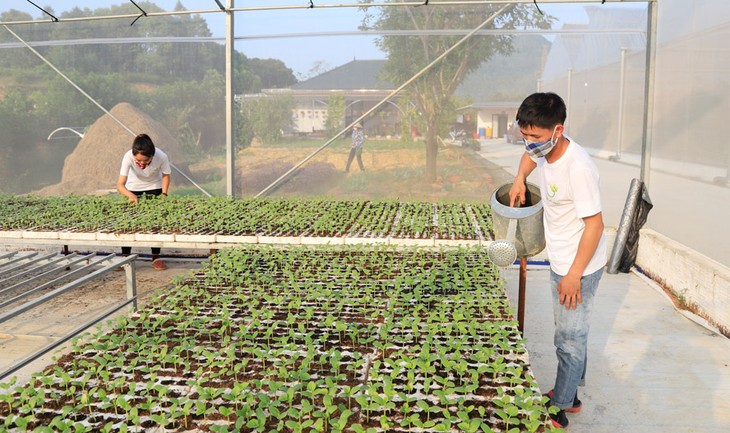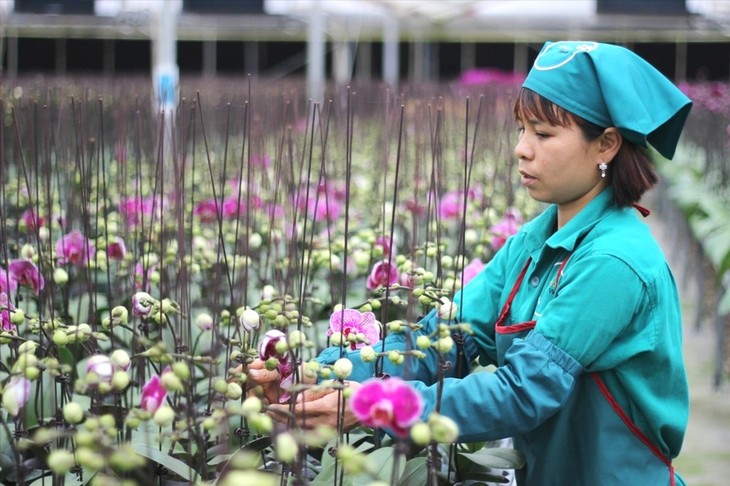(VOVWORLD) - Developing smart agriculture is a global trend which began a decade ago. Hanoi is leading the trend in Vietnam.
 Taking care of seedling at Quyet Tien high-tech agriculture cooperative in Soc Son district, Hanoi (Photo: Do Tam) Taking care of seedling at Quyet Tien high-tech agriculture cooperative in Soc Son district, Hanoi (Photo: Do Tam) |
Smart agriculture is the application of high-tech, biotechnology, mechanization, automation, and optimization of the production process to increase productivity, improve product quality, cut costs, protect the environment, and identify products by chains associated with AI and IT.
Hanoi currently has 164 hi-tech agricultural production models. Their products account for about 35% of the total value of agricultural production in the city.
Hanoi’s agriculture sector has promoted the application of new technology to agricultural production, including greenhouses with automated watering and cooling systems to stabilise temperature and humidity, and automatic feeding lines.
Remote control aircraft are used to fertilize and spray pesticides on rice. Artificial insemination is used in breeding, and biological products and automatic oxygen generators are used in aquaculture.
Doctor Ta Van Tuong, Deputy Director of the Hanoi Department of Agriculture and Rural Development, said, “Hanoi’s agriculture will be developed by value chain and deep processing. The center of seedling production in Vietnam, Hanoi uses less land resources but provides qualified seedlings for the whole country.”
According to Tuong, “Hanoi should create its own brand for its thousand-year-old agriculture, without abandoning current brands like Lang basil, Nhat Tan peaches, and Xuan Dinh sapote. We must maintain the brands of West Lake lotus, Tu Lien kumquats, Dai Thanh longans, Dien grapefruit, Tay Tuu flowers, and Mia chicken.”
Hanoi has defined agricultural planning as a key factor in developing smart agriculture. With a high rate of urbanization, especially in suburban districts, Hanoi has attached special importance to an urban agriculture space.
Professor Do Hau, Vice Chairman and Secretary General of the Vietnam Urban Planning and Development Association, said, “Urban agriculture plays an important role in Hanoi’s socio-economic development and serves as a role model in the development of peri-urban agriculture nationwide. So Hanoi should invest in peri-urban agriculture in the direction of eco-urban agriculture and green urban centers during its urbanization process and consider it the strategy for Hanoi’s agricultural development. In addition, the capital city needs to reorganize its urban agriculture towards sustainable urban planning against rapid urbanization.”
Hanoi’s urban agriculture is different from other cities because it has a peri-urban area large enough to produce farm produce to supply the inner city and not have to purchase mainly from other places.
Associate Professor Dao The Anh, Deputy Director of the Vietnam Academy of Agricultural Sciences, said, “Hanoi can outline its own project for urban agriculture to attract investment, especially private investment. With five districts to be upgraded in the near future, agriculture will play a very important role in the region. Due to the lack of farm land, it is necessary to apply technology and smart agriculture.
On March 17, Hanoi Party Committee rolled out a program to promote the implementation of the national program on new-style rural areas and agricultural restructuring to raise living standards in rural areas until 2025.
Its goal is to increase the share of hi-tech farming to 70% of the total agricultural production value by 2025.
 Dan Hoa Cooperative in Dan Phuong district has successfully built brand "Flora Vietnam” for moth orchid. (Photo: tuoitrethudo.com.vn) Dan Hoa Cooperative in Dan Phuong district has successfully built brand "Flora Vietnam” for moth orchid. (Photo: tuoitrethudo.com.vn) |
Successful agricultural development projects include projects to grow organic enoki mushrooms in My Duc district, orchids in Dan Phuong district, and safe vegetables in Hoai Duc district. Hanoi has promulgated policies to attract investment in high-tech agriculture.
Professor Tran Duy Quy, Chairman of the Vietnam Association of Rural Development Sciences, said, “It’s necessary to take advantage of the Vietnam Meteorological and Hydrological Administration which is based in Hanoi, to share big data with agencies for free at first. Once gardeners, farmers, and agriculture managers in Hanoi understand climatic cycles, it will greatly facilitate aquaculture, gardening, cultivation of vegetables, fruits, and flowers, and cattle and poultry breeding.”
Hanoi has been promoting the application of high-tech and smart equipment to agricultural production mainly in Me Linh, Gia Lam, Thuong Tin, Thanh Oai, Dan Phuong, and Dong Anh district. Hanoi’s goal is to develop smart agriculture in conjunction with international integration and adaptation to climate change.